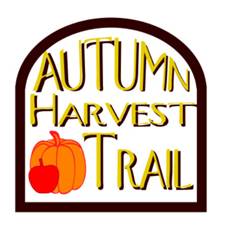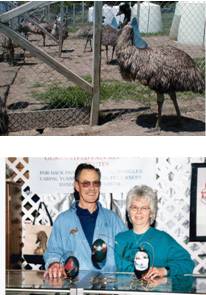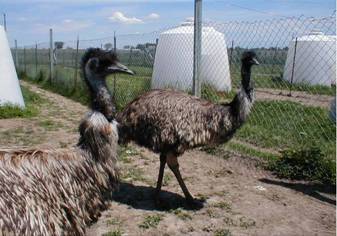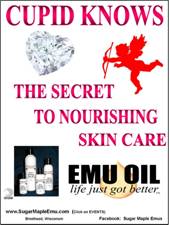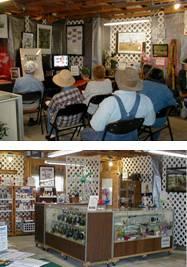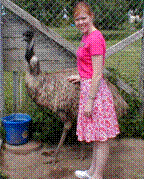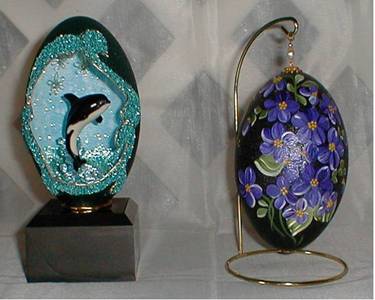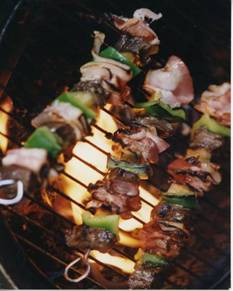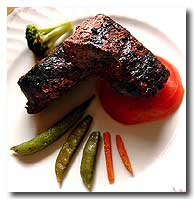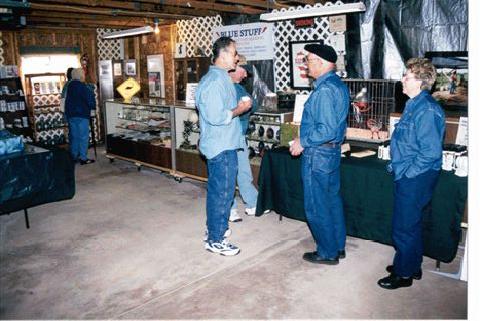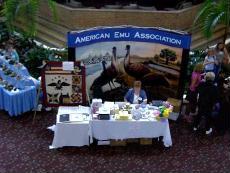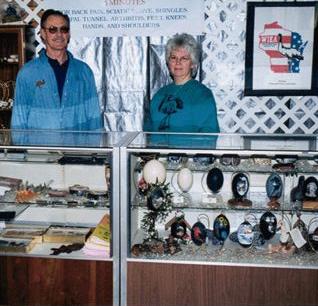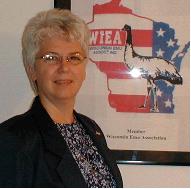



 .jpg) |
News and Updates |
||
|
Dry Hand Tips May 1, 2020
Dry Hand Tips -
Anti-bacterial soaps and hand sanitizers tend to dry out the skin on your hands.
Wash your hands before going to bed.
Apply EMU OIL to your hands.
Allow it to soak in for 10 minutes,
then apply your favorite hand lotion
to seal in the emu oil.
Your skin will look and feel
so much better in the morning.
|
||
|
Merry Christmas! December 21, 2017
Wishing all of our friends a very Merry Christmas & a Happy New Year !
As of December 4, 2017, the emus are gone, the emu farm has been sold and I have moved my Sugar Maple Emus business to Monroe, Wisconsin. Emu Oil and Emu Oil Products will still be available through our website http://www.SugarMapleEmu.com . A BIG "Thank You" to all who visited our emu farm and store, over the past 15 years. We hope that we educated and entertained you, while you toured our farm. I will miss visiting with you. |
||
|
Are Emus For You? January 19, 2017
New Pioneer Magazine Are Emus For You? Photo by Jeremiah Tucker For Joy Reavis, the emu is the ideal livestock to raise: profitable, easy to care for and fun. The birds are also a good fit on her small, 10-acre farm. Choose the right livestock and everything else falls into place. If you’re considering starting your own farmette, this is a valuable lesson, one that Joylene and Michael Reavis learned through experience. Joy and Michael both had full-time jobs when they purchased a postcard-perfect, 10-acre farm outside Brodhead, Wisconsin, complete with a rambling old white barn. The couple wanted to take advantage of the land, but they didn’t know what they wanted to farm or raise. Joy had been a dairy farmer before with her first husband, who had passed away in 1989, but that wasn’t an option. It was way too much work. So the couple bought some sheep, but shearing them was more trouble than they were worth. They tried goats, but they were hard on the fences. They raised some steers for beef, but too often they bought the cattle high in the spring only to sell them low in the fall. Then one day Michael came across an article in the local newspaper about emus. How About Emus? When Michael asked her about the possibility of raising the large Australian flightless birds on their small farm in the middle of Wisconsin, Joy was more than a little skeptical. “I told him to take some aspirin, lay down, and that he’d feel better when he woke up,” she recalled. But Joy agreed to visit a nearby farm that had a few emus, and, over the next year, the couple researched the birds and visited emu farms all over the country. Emus are raised for their incredibly lean and nutrient-rich meat as well as their omega-rich fat, which is turned into an oil that’s used as a highly sought-after skin care product. Eventually, Joy agreed to get into the emu business. During an early summer tour of her 12 adult emus—six husbands and six wives—she chuckled and said, “I always blame it on my husband.” Joy and Michael got the emus in the summer of 1995, naming their business Sugar Maple Emu Farm. They started out with three-month-old birds, and their first breeding couples were named Fred and Wilma and Betty and Barney after characters from The Flintstones. Each couple can lay as many as 25 fertile eggs. “We’d incubate the eggs and 52 days later we got the chicks,” Joy said. Emus are relatively easy to care for. At Sugar Maple, the adult emus live in large chain-link pens with tall domes for housing, and they eat a specialized ration made from local grains that’s scientifically formulated to provide the birds with all the necessary nutrients. The business grew slowly. They added a seasonal farm store where they sold emu meat, oils and other emu-related products, including painted eggs. The farm began to attract local shoppers and tourists. Joy, having served as president of the Wisconsin Emu Association, is able to talk at length about the health benefits and beef-like flavor of the meat, and the unique properties of emu oil. “It’s one of the few natural oils that will penetrate human skin, allowing the nutrients to reach the tissue,” she said. Michael passed away last year, but Joy continues to raise emus, and sell emu meat and emu-oil products. During the summer months, the farm is open for tours. School kids, tourists from Chicago, Christian motorcycle groups and many others have visited the farm. The newborn chicks, in particular, are always a hit. Today, two big fluffy Akbash dogs roam the property, keeping away raccoons that can bring in parasites that are lethal to the emus, and there is a herd of Katahdin sheep, a breed developed in Maine with hair-like wool that falls out naturally, meaning that they don’t have to be sheared. They graze the farm’s small pastures and are sold for their meat in the fall. The Perfect Mix The mix of animals and lifestyle proved perfect for Michael and Joy. “We finally found the right combination,” she said. Joy has been able to carry on the business, hauling the 50-pound feedbags and 10-pound buckets of water herself every day. She gets help from time to time from her brother-in-law and kids, but is mostly self-sufficient. She is planning to wind down the farm—she’s 67, though she credits the emu oil for keeping her looking much younger—but she still enjoys the emus. The females, she pointed out, make a booming sound like bongo drums—a byproduct of the unique air sacs they use to vocalize. “On a hot summer night, it’s nice to hear,” Joy said. “The sound will carry for miles.” To her, it’s like being in the Outback in the middle of Wisconsin. To learn more about Sugar Maple Farm, the medical benefits from emu oil and how to prepare the meat, please visit sugarmapleemu.com. A Few Emu Factoids Emus are flightless birds native to Australia, where they’ve lived for over 50 million years. Some researchers believe their ancestors may have roamed the Earth with the dinosaurs 80 million years ago. Adults are between 5 and 6 feet tall and weigh as much as 140 pounds. They can run as fast as 40 miles per hour and have the same skeletal structure as a Velociraptor dinosaur, though they are docile, relatively harmless creatures. Just beware of their powerful legs. “They only flail with their feet trying to get away, when they are caught,” Joy said. “We always handle them from behind to avoid getting kicked with their powerful legs.” |
||
|
Raising Emus Right ! January 18, 2017
5 Ways To Raise Emus Right
We asked Joylene several questions about raising the birds, and she gave us these answers. 1. Is there anything you would do to make your experience with the emus better, or would you not change anything? Knowing what I know now, I would have set up our pens with a central building instead of the individual huts. This would make it easier on me during the frigid winter weather. And if I were to start raising emus now, I would start out with breeders instead of chicks, so that I could start hatching chicks the first year, which would give me an income the following year instead of several years down the road. There are wholesale buyers for the emu meat and the emu fat now that were not available when I started raising emus. [Author’s note: Joy said emu meat can wholesale for $4 to $8 a pound, and the steaks can bring between $12 and $18 a pound. The fat sells for $14 or more a pound. One emu will yield about 25 pounds of meat and 15 to 25 pounds of fat.] 2. Are there any requirements to work with emus, such as permits? Emus are considered either alternative livestock or poultry, depending on what state you are located in. Here in Wisconsin, they have their own category. They are listed as ratites (the name for the diverse group of large flightless birds that includes emus and ostriches). No permits are required for raising livestock, poultry or ratites, though some local restrictions may apply. 3. How does one start a career working with emus? Learn as much as you can about them. The Emu Farmers Handbooks I & II by Phillip and Maria Minnaar are the emu farmer’s bible and contain all the information that you need to raise emus. The American Emu Association (AEA) also has the AEA Emu Primer that contains a lot of good information on raising them. All of these are available from the emu industry magazine, Emu Today & Tomorrow (ET&T). After you have learned how to raise them, then you need to find an emu farm where you can purchase your birds. 4. Are emus difficult to raise and train? Emus are very hardy. Once they are past three months of age, their main problems are injuries. They are susceptible to equine encephalitis, which is carried by mosquitos, which is more of a problem in some areas than others, and a brain worm parasite carried by raccoons (we keep raccoons off the property by using livestock guardian dogs). Other than these, they are very hardy and seldom are bothered with other problems if they are well cared for. 5. Would you consider this the career you’d be happy with for the rest of your working days? Oh, yes. The birds all have their own personalities. Some crave attention, others prefer to be left alone. And watching the chicks hatch is amazing! - See more at: http://www.realworldsurvivor.com/2016/03/07/5-ways-raise-emus-right/ |
||
|
Last Call for Brodhead Emu Farm Tours September 10, 2015
IF YOU GO |
||
|
End of an Era A Vision That Came True - September 3, 2015
After 21 years of raising emus Sugar Maple Emu Farm will no longer produce the emus that have been an integral part of their emu farm. Emu meat and oil products will still be available from Sugar Maple Emu Farm but, the “drumming” and “grunting” will no longer be heard. In the movie “Butch Cassidy and the Sundance Kid”, Butch Cassidy states - “I have vision and the rest of the world is wearing bifocals !” Back in 1995, Michael and Joylene Reavis, Brodhead, Wisconsin, had a vision. While many could not see it, the Reavis’ saw a bright future in the emu industry. With this in mind, they purchased their first 3 month old emus, Fred, Wilma, Betty and Barney. They named their 10 acre farm “Sugar Maple Emu Farm” because of the Sugar Maple trees that surrounded their house. They worked hard, built up their breeder numbers, hatched chicks and shipped 16 month old emus each year for processing. They turned their garage into a seasonal store and gave farm tours to visitors. They loved their life on their small farm They envisioned an emu buyer or a livestock sale barn, where they could send their birds when they reached processing age and then receive a check in the mail just like with other livestock. Unfortunately, this never happened so, they processed their emus and brought the frozen meat home to sell. The fat was shipped directly to the oil processor for rendering, refining and bottling before being shipped back to them as needed. Both Mike and Joylene had a history in hog and dairy farming. Both had experience working with people but, no serious background in sales. Mike took care of labor (he was fantastic with the animals). By reading everything Joylene could find on sales and advertising, she taught herself how to sell products, give farm tours, write press releases, create ads, use a computer and become familiar with public speaking, all while working a full time job and helping Mike with daily chores. They both worked at full-time jobs away from the farm but, they still managed to build pens, put up fences, purchase feeders and buildings, haul manure, care for the breeder pairs, hatch chicks and keep the process emus fed and watered until they were shipped at 16 months to the processing plant for slaughter. Over the past 21 years they hatched and raised over 1,500 emus. During the last five years they finally started to see their vision of a profitable business come together. During the early years, they processed the emus and brought the meat and oil back to the farm to promote and sell to customers. Today their business has definitely changed for the better. Once the live birds leave in the trailer, not all of their products are returned to the farm. They now have buyers for the fat and any extra meat. These items are wholesale purchased directly from the processing plant and never come back to the farm. Several area stores also buy their emu oil products to resell to customers. Mike and Joylene lived their dream and thoroughly enjoyed it. It has been gratifying for them to see all of their hard work finally paying off and their emu farm turn into a profitable business. Last year, with 60 emus shipped for processing, the gross sales from wholesale, retail and live animal sales topped anything that they had seen before this. For a small “mom and pop” operation without aggressively promoting their business, they have seen their goal be reached. Even though Mike is no longer here to see it, their vision has definitely become a reality. Farm tours “by appointment” will no longer be given after September 14, 2015 but, Joylene plans to continue selling emu products. She can be reached by visiting the Sugar Maple Emu Farm website, www.SugarMapleEmu.com , or by calling 608-897-8224. ##### |
||
|
End of an Era A Vision That Came True March 2, 2015
After 21 years of raising emus Sugar Maple Emu Farm will no longer produce the emus that have been an integral part of their emu farm. Emu meat and oil products will still be available from Sugar Maple Emu Farm but, the “drumming” and “grunting” will no longer be heard. In the movie “Butch Cassidy and the Sundance Kid”, Butch Cassidy states - “I have vision and the rest of the world is wearing bifocals !” Back in 1995, Michael and Joylene Reavis, Brodhead, Wisconsin, had a vision. While many could not see it, the Reavis’ saw a bright future in the emu industry. With this in mind, they purchased their first 3 month old emus, Fred, Wilma, Betty and Barney. They named their 10 acre farm “Sugar Maple Emu Farm” because of the Sugar Maple trees that surrounded their house. They worked hard, built up their breeder numbers, hatched chicks and shipped 16 month old emus each year for processing. They turned their garage into a seasonal store and gave farm tours to visitors. They loved their life on their small farm They envisioned an emu buyer or a livestock sale barn, where they could send their birds when they reached processing age and then receive a check in the mail just like with other livestock. Unfortunately, that never happened so, they processed their emus and brought the frozen meat home to sell. The fat was shipped directly to the oil processor for rendering, refining and bottling before being shipped back to them as needed. Both Mike and Joylene had a history in hog and dairy farming. Both had experience working with people but, no serious background in sales. Mike took care of labor (he was fantastic with the animals). By reading everything Joylene could find on sales and advertising, she taught herself how to sell products, give farm tours, write press releases, create ads, use a computer and become familiar with public speaking, all while working a full time job and helping Mike with daily chores. They both worked at full-time jobs away from the farm but, they still managed to build pens, put up fences, purchase feeders and buildings, haul manure, care for the breeder pairs, hatch chicks and keep the process emus fed and watered until they were shipped at 16 months to the processing plant for slaughter. Over the past 21 years they hatched and raised over 1,500 emus. During the last five years they finally started to see their vision of a profitable business come together. During the early years, they processed the emus and brought the meat and oil back to the farm to promote and sell to customers. Today their business has definitely changed for the better. Once the live birds leave in the trailer, not all of their products are returned to the farm. They now have buyers for the fat and any extra meat. These items are wholesale purchased directly from the processing plant and never come back to the farm. Several area stores also buy their emu oil products to resell to customers. Mike and Joylene lived their dream and thoroughly enjoyed it. It has been gratifying for them to see all of their hard work finally paying off and their emu farm turn into a profitable business. Last year, with 60 emus shipped for processing, the gross sales from wholesale, retail and live animal sales topped anything that they had seen before this. For a small “mom and pop” operation without aggressively promoting their business, they have seen their goal be reached. Even though Mike is no longer here to see it, their vision has definitely become a reality. Farm tours “by appointment” will no longer be given after September 14, 2015 but, Joylene plans to continue selling emu products. She can be reached by visiting the Sugar Maple Emu Farm website, www.SugarMapleEmu.com , or by calling 608-897-8224. ##### |
||
|
Sugar Maple Emus Makes Raising Emus Fun September 11, 2013
GOOGLE ALERT |
||
|
Local Emu Growers Receive Award July 15, 2013
Tony Cithryn - AEA president, Joylene Reavis, Mike Eppley - outgoing AEA president |
||
|
Brodhead woman is active in emu farming by P.J. Francis October 19, 2011
National Business Women's Week
October 17-21, 2011 BRODHEAD - Joylene Reavis of Sugar Maple Emu Farm knows a lot about farming. Joylene was born in Lockport, Illinois and raised on a 10 acre horse farm. In 1971 she and her late husband, Jerome Paul, moved to a dairy farm near Brodhead in 1971 where they milked a 50 Holstein cow dairy herd. In 1986 she became an employee at the Janesville GM Assembly plant where she worked for 20 years assembling pick-up trucks, Cavaliers and Tahoes. She was widowed in 1989 and married Mike Reavis, Sr. in 1993. Joylene left GM in 2006 to devote herself to full time farm tours throughout the summer and fall seasons. Joylene is the president of the Wisconsin Emu Association (WIEA) since 2002 and has been on its Board of Directors since 1999. She has served on the Board of Directors of the American Emu Association (AEA) since 2007 as Region 3 Director and she presently holds the office of secretary. This past winter she became a member of the Board of Directors of the Wisconsin Agricultural Tourism Association (WATA). Along with those responsibilities, Joylene also chairs the AEA Public Relations Committee, the AEA Agriculture/Legislation Committee, the AEA National Convention Committee and the AEA National Emu Week Committee. She loves to read and has taught herself how to use the computer and to be a savvy business woman. She loves meeting people and telling them about the passion she has for the emu industry. The first emus arrived at their farm in 1995 and Joylene and Mike have never looked back. Since then they have devoted their time to raising those interesting members of the ratite family. The ratite family of flightless birds includes the ostrich, cassowary, rhea, kiwi and emu. "The emus are probably the most docile and the easiest to get along with," said Joylene. "My husband says it is the most fun he's had farming." Sugar Maple Emu Farm has been in business since 1995 when two pair of three-month-old emus arrived. “The only things their wings are useful for is they have a very good blood supply – a lot of veins in them – and in warm weather they are able to lower those wings just enough below the feathers that air can circulate around and it helps to cool their blood system,” Reavis explained. “In wintertime they pull them up and under the feathers and that keeps them warm.” The emu is an extremely adaptable creature. In their native Australia they are found in the 120 degree desert and in the snowlines of the mountains. They are raised successfully throughout the United States and in South America and Canada. “The emu is the only living bird that starts its laying season as the days shorten whereas others start in the spring as the days lengthen,” Reavis pointed out. “The reasoning behind that is that in Australia the summertime is going into the drought season. It is very dry and there is not a lot of forage and food for them. The fall and into the winter is the rainy season so there is more food so they have evolved to suit. “The eggs are edible and have a high emu oil content which is very good for you. We have people who are sensitive to chicken eggs that find they can eat emu eggs.” One large emu egg is equivalent to about 12 medium chicken eggs and they can be scrambled, made into omelets or boiled. It takes about an hour of simmering to boil an emu egg. “The emu oil is nothing more than the rendered and refined fat from the emu,” explained Reavis. “It contains natural anti-inflammatories and omegas 3, 6 and 9. It has the same fat lipid panel as human skin and it is one of the few natural oils that penetrate the human skin barrier. It goes down very deep into the lower layers of the skin, muscles, ligaments and joints and takes all that nutrition with it so the cells can rebuild and repair themselves. The anti-inflammatory property helps to soothe any inflammation, redness, and swelling and helps to relieve pain.” Emu meat is highly nutritious. Sugar Maple Emu Farm is licensed by the State of Wisconsin to sell USDA and Wisconsin State inspected emu meat at the farm. All emu meat is quick frozen at the processing plant to insure quality & freshness. Call for prices and availability. Sugar Maple Emu Farm is a member of the Wisconsin Emu Association, American Emu Association, and Wisconsin Agricultural Tourism Association, Farm Bureau and Brodhead Chamber of Commerce. “We have learned a lot from these associations,” Reavis explained. “They have a lot of information and some have email lists where you can ask questions. They hold a national or state conventions and issue newsletters.” From May 1 through October 31 the emu farm store is set up with lots of products and information for visitors to see. All sales and farm tours are by "appointment only" to make sure someone will be there when visitors arrive. The retail store at Sugar Maple Emu Farm contains a large selection of emu related products. Among the items for sale are beautifully painted emu eggs. Some of them were painted by Joylene's sister-in-law, Veda Olson, and others were painted by Debbie Niedermeier-Wartgow of Debbie Jean’s Custom Framing and Whimsical Treasures on Highway 81 east of Brodhead. To see some really cool painted and carved emu eggs visit www.AEAEggArtContest.com. Sugar Maple Emu Farm is located at W805 Pedee Road, Brodhead, WI 53520. Call 1-608-897-8224 or 1-866-608-8224 (toll free). You can also reach them by visiting their website, www.SugarMapleEmu.com or LIKE us on Facebook: Sugar Maple Emus or http://facebook.com/SugarMapleEmus (public page). _________ Reprinted with permission from The Brodhead Independent-REGISTER October 19, 2011 |
||
|
Green County Farm Participating in the WI Autumn Harvest Trail September 9, 2011
BRODHEAD --- As members of the Wisconsin Agriculture Tourism Association (WATA), Sugar Maple Emu Farm, owned and operated by Mike and Joylene Reavis, will be one of the stops featured on Wisconsin's 2011 Autumn Harvest Trail and will host tours of their farm thru October 31st. Sugar Maple Emu Farm at W805 Pedee Rd., is located 7 miles SW of Brodhead, Wisconsin in the SE corner of Green County. As a part of Wisconsin's Autumn Harvest Trail, when touring the emu farm this season, visitors can enter a drawing for a Sugar Maple Emu Farm gift certificate with a value of $80.00 when presented at their emu farm for emu oil, emu meat and other emu related items.
The Autumn Harvest Trail is a Wisconsin food and culture trail system geared to bring consumers in contact with Wisconsin’s local food producers and local tourist destinations for the purpose of increasing the sale and consumption of locally grown foods. This project is coordinated by the Wisconsin Apple Grower’s, Wisconsin Fresh Market Vegetable Grower’s, and Wisconsin Agriculture Tourism Association through a “Specialty Crop Grant” program from the Wisconsin Department of Agriculture, Trade & Consumer Protection. More information on Wisconsin's Autumn Harvest Trail can be found by going to http://www.visitdairyland.com and clicking on the Autumn Harvest Trail link. Visitors to the emu farm will view an entertaining and informative video, see the pen areas of the farming operation, browse the seasonal store that is set-up from May through October and sign-up to win a gift certificate during the September/October Autumn Harvest Trail event. "We do ask that all visitors sign a guest book", said Ms. Reavis. She added, "After the video, visitors will be able to view the breeder emus, as well as, this season's emu chicks. We do NOT allow visitors to explore the farm on their own. All pen tours are with a knowledgeable tour guide and are by APPOINTMENT ONLY". Most people are surprised to learn that, for the first 2 months, emu chicks have feathers with chipmunk stripes of brown, black, tan and white. They are striped until they are about 10 weeks old, then during their third month they will turn a chocolate brown with black heads and necks. As adults they will be a speckled, grayish brown, stand 5 ½ - 6 feet tall and weigh 110 - 130 pounds. Originally from Australia, emus are being raised in the United States for their lean red meat, but farmers, like Mike and Joylene, find additional income in the other co-products such as leather, oil, eggs and feathers. Although things are changing in the emu industry, for now, unlike other poultry, emus are not taken to livestock auctions or sold directly to cattle buyers. Instead, the farmers arrange for processing and will then handle retail and wholesale sales of the end products. Sugar Maple Emu Farm is licensed by the state of Wisconsin to sell emu products and frozen USDA and State inspected emu meat Sugar Maple Emu Farm invites you to schedule a tour for individuals or groups throughout the late spring, summer and fall seasons from May through October by APPOINTMENT ONLY. For more information about tours, visit www.SugarMapleEmu.com , click on "EVENTS", then click on the "FARM TOURS" links or call 608-897-8224. ##### |
||
|
Sugar Maple Emu Farm Story April 20, 2011
Several issues ago, Sugar Maple Emu Farm was featured in the emu industry magazine, Emu Today & Tomorrow. Emu Today & Tomorrow the emu industry magazine June/July 2010 ___ SUGAR MAPLE EMUS written by Joy Reavis with Jill M. Smith Sugar Maple Emu Farm Our Start My husband, Mike, and I purchased our first emus in 1995, just as the prices were starting on their way down. Mike saw an article in a local newspaper about someone who had purchased several ostriches for their small acreage and he thought it would be something that we could do on our 10 Acre farm. But I told him, "Take an aspirin, go lay down and THAT idea will go away!" However, the more that we learned about ostriches, the more we decided that they were not for us. An 8 foot tall bird that can weigh up to 300 pounds seemed a little too big for us to handle. And, the fact that the males become quite aggressive during breeding season just didn't appeal to us. People just north of our town purchased some emus and the newspaper did a front page article about them. We visited them, looked at the birds and received some information about emus and their amazing oil. After two years of research, visiting emu farms and attending seminars, we decided that emus were what we wanted to raise. Although raising emus was new for us, this wasn’t our first experience in agriculture. My husband and I both have farming backgrounds. Mike was raised on a dairy farm, and I was raised on a rural horse farm. My first husband and I dairy farmed along with raising beef and hogs. I was always fascinated with incubating and hatching ducks and geese. We usually had chickens, ducks, geese and turkeys around the farm. This fascination with hatching eggs and raising birds has served me well in our current operation. Developing the Business From the first day that we received our emus, we were in the "tourism" business. We are fortunate to have a beautiful setting for our farm and, even though the buildings are old and starting to show wear, we have often been told that it is a showplace. This helped to lead us into agri-tourism. We give farm tours from May through October for one person, a family, or a group. All tours and store sales are by appointment only. Soon after we began giving tours, I started hanging tarps in our garage to block off a section so that I could leave my products and information set-up to show interested visitors. Each year the area I used got bigger and bigger until now my store covers a 20'x30' area. This area is used for video viewing and displays of products, egg art, jewelry and other emu related items. Marketing Word of mouth led to increased emu oil product sales. I gave our business card out to "everyone" who asked about emus or products. Our products are now wholesaled locally to a pharmacy, a chiropractic clinic and several health food stores. It has taken diligence and creativity to market our products and to begin to realize money from the venture. When we first began, we had hoped to raise the emus, put them on a truck and then wait for a check in the mail, just like we did with our cattle and hogs. That just never happened for us. Not at the beginning, anyway. We started talking to emu oil product companies that offered "oil banks" so that we could utilize the emu oil that we produced. I learned to write press releases through advice in e-mails from others on an online emu list and started submitting these "articles" regularly to our local and state newspapers. Not very many got printed at first, but we became known by the local media by doing this. It has led to some really nice feature stories about our farm over the years. And now, these press releases produce our main advertising along with a continuous classified ad in our local weekly newspaper, on several tourism booklets and websites and listing of our website on numerous other websites Our biggest seller is the Emu Oil. We have private labeled our certified emu oil under the "Sugar Maple Emus Naturals" label. We use our banked emu oil to purchase products from Purple Emu and EPMI and have built up an emu meat clientele over the years. Without a lot of effort on our part, we sell about 1,000 pounds of emu meat each year. Emu egg shells and artwork, jewelry, leather products and other emu related items round out our sales. In 2002 we had a website built and started promoting online sales. It took more than two years before the income from the website started to pay for the hosting and credit card fees. There is a saying, "If you build it, they will come." Well, not really. Just because we built a website, it did not mean customers came right away. Today, website sales are steady and pick up during the winter months when the on farm store is closed. We now sell wholesale to several local stores, have website sales throughout the US and sell through our farm store, which is open by APPOINTMENT from May through October. Being an American Emu Association Certified Business Members (CBM) gives us exposure to AEA website visitors and customer leads. It allows us to support the AEA while promoting our business. Facilities and Processes We feed our emus a good, balanced emu feed formula that we have processed at a nearby Cargill feed mill. The feed mill provides the grain which is ground, mixed, pelleted, bagged and delivered to our farm. This has been good for us because with such small acreage, we do not have the room to grow our own grain. The only drawback to purchasing this feed is that we have to order 2-3 tons of feed at a time. However, we are very happy with our feed formulation as it produces thriving chicks and our process birds have good muscling and lots of fat. Currently, including chicks, we have around 50 emus right now, but we had several years where we had up to 200 emus on our farm at one time. Our incubators and hatchers are in our basement, which is where the newly hatched chicks stay until they begin to eat and start to poop. At that time they are "banished" to the chick barn, an 18' x 30' building where the chicks stay until they are 6 months old. At that time they are moved to one of the three 50' x 60' grow out pens where they will stay until they are sent for processing. Breeder pairs are each kept in 18' x 125' pens with polydome shelters that are 8' in diameter and 8' high. (The shelters are the top of a grain holding bin where there would be a matching half bolted to the bottom of the top half. An auger would come out of the bottom.) These act like oversized calf huts and are where our breeders are housed year round, even through the coldest winter months. To control pests we use a lot of Diatomaceous Earth. This helps to control fly larvae in the manure piles. It is, also, mixed with the feed to help eliminate internal parasites. Emptying containers to prevent standing water and keeping the grass mowed short around the pens helps us to control mosquitoes. Advice to Others Probably the most important advice I can give current and potential emu growers is to learn as much as you can about these amazing birds by reading books, joining e-mail lists and meeting with other emu farmer and ranchers. And, even after years of experience, when you think you have these emus all figured out, something new will happen that will shoot down your "proven" theories. You will find that you never stop learning something new about emus. Be prepared to grow in some unexpected areas. My husband and I have. Neither of us was skilled in public speaking or sales and marketing when we began, but, out of necessity, we learned as we went. The customer is the most important thing that a business can have so, we have learned to treat them with the respect they deserve. ? The Future The entire emu industry is growing and expanding. When we started in the mid-nineties, we had to promote our emu meat directly to the consumer in order to sell it. Now, there are wholesale buyers looking for emu meat. We learned to sell and market the emu oil and oil products directly to consumers because that was the only way that we could earn money from our emu business. Now, there are emu oil companies that are purchasing large quantities of fresh frozen emu fat. Even hides, feathers, edible eggs, fertile eggs and egg shells are being sought after by some buyers. For Mike and I personally, we plan to keep on, keeping on, as long as we can. It is only the two of us raising the emus and running the business. We are both in our 60s and we, physically, will not be able to keep raising emus forever. If handling the emusbecome too difficult, we will still continue to sell products and support the emu industry. We will continue for as long as we can. It’s a passion... a love for these animals and this industry that keeps us going. There’s an unwillingness to give up because we truly believe that this is a product that is beneficial to society. Mike says with a smile that this is the most fun he has ever had farming. _________ |
||
|
Spring is in the Air at the Emu Farm March 30, 2011
BRODHEAD, WI - Once again on May 1st, Mike and Joylene Reavis, owners and operators of Sugar Maple Emu Farm, will open their seasonal on-farm store for retail sales and offer farm tours by appointment. The on-farm store offers retail sales of emu oil, emu oil products, emu meat, emu leather products, blown emu egg shells and decorated emu eggs. Their emu farm is located in the southeast corner of Green County on Pedee Road, 4 miles south of Hwy 11-81 and just west of Mt. Hope Road.
Each spring at the beginning of April, as emu chicks are hatching and lambs are being born, the Reavis' are busy working in their garage. The area where they keep their vehicles during the winter will be transformed into their on-farm store. Shelves of emu oil products will line the east wall and glass display cases will soon house elegant emu egg shell artwork along with many other emu items. Posters will be place on the walls with other emu information throughout the store to educate visitors and a video viewing area is set up at one end of the store where the pen tours will begin with an informative and entertaining film. Joylene stated, "The store will be set-up just in time for National Emu Week (N.E.W.), May 7-15, 2011 and for our participation in the Brodhead Chamber of Commerce "Tour the Farms Day" on May 7th with guided emu farm tours on that day starting every half hour from 9:30 am - 4:30 pm. "Tour the Farms Day" will include four area farms: Sugar Maple Emu Farm (egg to product emu farm), Scotch Hill Farm (goats & CSA garden), Kinkoona Farm (sheep & day camp), Morning Star Farm (vegetables, fruit & community gardens) and a contest for the best decorated wooden sign Rooster on the square in downtown Brodhead. More information can be found by visiting our website and clicking on EVENTS. Although "Tour the Farms Day" is a big event for the emu farm, the on-farm store is set-up for sales by appointment from May through October. Sales and Tours are by appointment only to assure that someone will be there when visitors arrive. Just call ahead to schedule your visit. Individuals, families and groups are welcome to take a guided tour of the emu farm. Visitors often come back time and again. It is a uniquely, enjoyable, learning experience!" The Reavis' have been raising emus (large, flightless birds related to the ostrich) since 1995 and are active members of the American Emu Association (AEA), the Wisconsin Emu Association (WIEA), the Brodhead Chamber of Commerce and the Wisconsin Agricultural Tourism Association (WATA). They have recently added a small flock of Katahdin sheep (hair sheep) and are expecting their first lambs this spring. Be sure to schedule a farm tour sometime this year. To visit the store or to arrange for a tour, call Sugar Maple Emu Farm at 608-897-8224 or visit their website at www.SugarMapleEmu.com (click on EVENTS) or visit SugarMapleEmus on Facebook at http://facebook.com/SugarMapleEmus . ##### |
||
|
Cupid Knows the Secret to Nourishing Skin Care January 27, 2011
Cupid knows that rough, cracked hands and scaly, dry legs can ruin that romantic moment. The face, hands, arms and legs are subjected to cold, harsh, winter winds and dry, heated indoor air at this time of year. Emu Oil is the answer to dry, chapped and irritated skin.
The skin is a natural barrier against Winter's harsh conditions. The outermost layer of skin (epidermis) is very important to keeping the inner layers of skin protected. Leading skin specialists agree that this is the time of year that the skin craves oils to replenish those being lost through cold and dry conditions. Emu Oil contains wonderful Essential Fatty Acids (EFAs), including Omega 3, Omega 6 and Omega 9. These EFAs along with other short chain fatty acids, help to keep the outer and inner layers of the skin nourished, moisturized and rehydrated. By using Emu Oil you can feed the outer surface of skin while replenishing the essential fatty acids deeper within the lower layers of the skin. Emu Oil can be a lifesaver for dry skin. Emu Oil's amazing transdermal properties allow it to quickly penetrate to the lower layers of the skin delivering its nutrients to the cells. It is a nourishing and moisturizing oil, which has the same lipid (fat) panel as human skin, that rebalances the fatty acids to ensure softer and more hydrated skin. Emu Oil is all natural. There are no chemicals and no fillers to further irritate your skin’s already delicate state. Emu Oil is safe for all ages. Whether newborn or elderly, it will help to soothe your dry, itchy skin problems. When you purchase Emu Oil, look for the AEA Certified Emu Oil logo. This logo ensures that the Emu Oil has met or exceeded the AEA guidelines for Fully Refined Emu Oil. For more information about Emu Oil and other emu oil products, call Sugar Maple Emu Farm at 608-897-8224 or, visit www.SugarMapleEmu.com . ##### |
||
|
IN SEARCH OF THE ELUSIVE FLORIDA EMU August 20, 2009
The American Emu Association (AEA) held its 2009 National Convention in Orlando, Florida during the second full week of July.
Several AEA members, who attended the convention, spent a few extra days exploring the Orlando area. Trips to Sea World, Universal Studios, Gatorland, Airboat Rides, Disney World and discount shopping malls seemed to be the most popular. Emu grower, Joylene Reavis of Brodhead, Wisconsin found her way to Disney World's Animal Kingdom. After hearing reports of the only picture of an emu at Walt Disney World being at Animal Kingdom's Rafiki Planet Watch, Joylene, her son, Jim Paul and granddaughter, Emily Paul, of Monroe, Wisconsin, set out to find this elusive picture. This trek took them well off the beaten path. After a pleasant open train ride through the "jungle" area near the African Safari attraction, they arrived at Rafiki's Planet Watch, an area dedicated to encouraging birds, butterflies and other "critters" with earth friendly areas for these species to visit and make their homes. It was a beautiful, shaded area that was quite enjoyable to walk through. At the end of the main trail, they entered the large, air-conditioned Conservation Station. They immediately saw the big wall with a mural depicting hundreds of animal. Directly in front of them they found the painting of an emu and a cassowary. A picture was taken so that they could show off their trophy find. The emu had been found. This was only one of their many great memories. Joylene and her husband, Mike, own and operate Sugar Maple Emu Farm in Brodhead, Wisconsin. The 2010 American Emu Association National Convention will be held in Des Moines, Iowa. More information will be available later this year under EVENTS at www.aea-emu.org . _______ |
||
|
EMU OIL! The Answer to Winter's Skin Woes November 28, 2008
BRODHEAD, WI --- Exposure to harsh winter weather is responsible for dry, chapped or irritated skin on the face, hands, arms and legs. These are the areas that are subjected to the cold, harsh winds or the dry, heated indoor air at this time of year. Sugar Maple Emu Farm has the answer to these winter woes.
Our skin is a natural barrier against Winter's harsh conditions. The outermost layer of skin (epidermis) is very important to keeping the inner layers of skin protected. Leading skin specialists agree that this is the time of year that your skin craves oils to replenish those being lost through cold and dry conditions. Emu Oil from Sugar Maple Emu Naturals, contains wonderful Essential Fatty Acids, including Omega 3, Omega 6 and Omega 9. These, along with other short chain fatty acids, help to keep the outer and inner layers of your skin nourished, moisturized and rehydrated. By using Sugar Maple Emu Naturals Emu Oil you can continue to feed the outer surface of skin while replenishing the essential fatty acids deeper within the lower layers of your skin. Sugar Maple Emu Naturals Emu Oil is safe for all ages. Whether newborn or elderly, it will help to alleviate your dry, itchy skin problems. Joylene Reavis, co-owner of Sugar Maple Emu Farm, states, "Sugar Maple Emu Naturals Emu Oil can be a lifesaver for your dry skin." Emu oil's amazing transdermal properties quickly penetrate to the third layer of the derma to rush the nourishing components, which make up its complex structure, to the dehydrated cells. It is nourishing and moisturizing oil that mimics the skin’s own oils and rebalances the lipid fatty acid composition in skin to ensure softer, moisturized skin. Ms. Reavis added, "Our Pure, Fully Refined Sugar Maple Emu Naturals Emu Oil is all-natural. There are no chemicals and no fillers to further irritate your skin’s already delicate state.“ For extremely dry skin conditions, Reavis recommends "Herbal Garden Hand & Body Lotion" and "White Satin Moisturizing Cream" which are ALL NATURAL and made with only the finest oils, natural active ingredients and herbal extracts. These ingredients will nourish the skin cells so that the cells can rebuild themselves. "Herbal Garden Hand & Body Lotion" and "White Satin Moisturizing Cream" each contain 30% Emu Oil. For more information about Sugar Maple Emu Naturals Emu Oil and other emu oil products, call Sugar Maple Emu Farm at 608-897-8224 or (toll free) 866-608-8224 or, visit www.SugarMapleEmu.com . Sugar Maple Emu Farm is a member of the American Emu Association (AEA) Certified Business Member Program. AEA is a non-profit trade association representing the emu industry. The emu industry is an alternative agricultural industry, dominated by the small farmer, who is devoted to humane and environmentally positive practices that will produce beneficial products for society. For more information about the American Emu Association (AEA) or the emu industry visit http://www.aea-emu.org or call 541-332-0675. |
||
|
LOCAL EMU FARM HOLDS OPEN HOUSE May 3, 2007
Sugar Maple Emu Farm Invites Area Residents to Visit
BRODHEAD — As a part of their participation in National Emu Week (N.E.W.), May 5 - 13, 2007, Mike and Joylene Reavis, owners of Sugar Maple Emu Farm, are inviting folks to come out for a visit from 10 AM to 3 PM on Saturday and Sunday, May 5 & 6 and again on Saturday and Sunday, May 12 & 13 when Sugar Maple Emu Farm joins with several area farms for Brodhead's Four Farm Tour. Open House will be held each day from 10 AM - 3 PM with pen tours at 10:30 AM, 1 PM and 2:30 PM, weather permitting. National Emu Week is sponsored by the American Emu Association (AEA) to educate the general public about emus and the products derived from the farm animal. This is the ninth year for the nationwide event and the sixth year that the Reavis' have held an Open House. Originally from Australia, emu are being raised in the United States for their lean red meat, but farmers like Mike and Joylene find additional income in the food co-products such as leather, oil, eggs and feathers. Unlike other poultries, emu is not taken to auction or sold directly to slaughter facilities. The farmer arranges for processing and handles sale of the end products. During the Open House there will be USDA & State inspected red meat, feathers, leather products, clean blown eggs and decorated eggshells along with health and beauty products made with certified, fully refined emu oil, all available for purchase. Visitors will view an entertaining and informative video, see the pen areas of the farming operation and browse the seasonal store that is set-up from May through September. “We do ask that visitors sign a guest book” said Ms. Reavis. “We do not allow anyone full access to our operation." All pen tours are with a tour guide only. Visitors will be able to view the breeders as well as 2 week old emu chicks. These chicks are brown, black and white striped until they are two months old. At that time they turn a chocolate brown. As adults they will be a grayish brown, stand 5 ½ - 6 feet tall and weigh 110 - 130 pounds. Sugar Maple Emu Farm hosts pen tours for individuals or groups from May through September by appointment. To schedule a tour for your group or to find out more information about the heart healthy red meat, the oil or other products, visit their website, www.SugarMapleEmu.com or call 608-897-8224. For more information about the Open House or the Brodhead - Four Farm Tour, visit www.SugarMapleEmu.com , click on "SPECIALS", then click on "NATIONAL EMU WEEK" or "FOUR FARM TOUR". For more information about the AEA, or the emu industry visit the AEA website at www.aea-emu.org or call 541-332-0675. ##### |
||
|
2005/2006 "Alice in Dairyland" Visits Local Emu Farm August 19, 2005
BRODHEAD --- Newly crowned "Alice in Dairyland", Gena Cooper, spent a day in late June at Sugar Maple Emu Farm learning about emus. Emus are large birds, native to Australia and related to the ostrich. Sugar Maple Emu Farm is owned and operated by Mike and Joylene Reavis and located 8 miles Southwest of Brodhead. The Reavis' were joined at their farm by emu growers, Eileen Clark and Don & Phyllis Toberman, to educate both Gena Cooper and the new Marketing Director for "Something Special from Wisconsin" and "Alice in Dairyland", Lois Federman about the expanding emu industry.
Gena learned a lot about the emu industry and was soon "up close and personal" with a live emu. "I never realized how many different products can be made from one emu'" she said. Gena was surprised to learn about the many uses for emu oil, the delicious and nutritious properties of emu meat, the soft and supple, quill patterned leather that is made from emu hides and the beautiful green eggshells that lend themselves to many different kinds of egg art. Alice in Dairyland is the agricultural spokesperson for Wisconsin's agricultural products and for the "Something Special from Wisconsin" program. For more information about emus, visit the Wisconsin Emu Association (WIEA) website www.wiemu.org For more information about the "Something Special from Wisconsin" program visit the Wisconsin Department of Agriculture (WI-DATCP) website www.datcp.state.wi.us |
||
|
2005 EMU EGG DECORATING CONTEST WINNERS May 15, 2005
BRODHEAD, WI - For the last two weeks in April, exquisitely decorated emu eggs were on display at the Bank of Brodhead and on May 7 and 8 they were displayed at the Sugar Maple Emu Farm's on-farm store during their National Emu Week CELEBRATION. These eggs were the winners of the annual Emu Egg Decorating Contest held by Sugar Maple Emu Farm to celebrate National Emu Week, held this year from May 7 - 15.
Many "ooh's" and "aah's" could be heard as onlookers admired these beautiful "works of art." These large, dark green eggs with layers of green, turquoise and white, lend themselves to the creation of beautiful art work. The eggs can be painted and hung like Christmas ornaments. They can be carved with colorful patterns being uncovered as the artist carves into the dark green, turquoise and white layers of these remarkable eggs. A series of lacework cuts can transform an emu egg into many interesting items including nightlights. They can be made into jewelry boxes and music boxes and decorated like the famous Faberge eggs. Artists are limited only by their imagination. The "PAINTED" category's 1st place winner was a detailed, painted eggshell with a cascade of violets. This egg was painted by Mildred Harmann, Forestville, WI. 1st place in the "JEWELED" category was a stunning egg that featured a lighted, open faced emu eggshell, surrounded by blue glitter with a whale inside. This egg was decorated by Bonnie Hartley, Beloit, WI. For more information about emu and emu eggs contact the American Emu Association, 1-541-332-0675, website, www.aea-emu.org For local information about emu, emu eggs or emu oil visit the Wisconsin Emu Association website: www.wiemu.org or contact Joylene Reavis, 608-897-8224 / 866-608-8224 toll free (afternoons). |
||
|
Emu, THE Natural Alternative™ for the Backyard Grill May 15, 2005
A hot new food for the outdoor cooking season
Fifty years ago you might see the backyard grill in action three times in a year: Memorial Day, Independence Day and Labor Day. Dad would wrestle it out of the garage, knock off the dust and hand Mom the rack to clean, usually at her insistence since the blackened grime “added flavor” and “the fire would burn off any germs.” She would carry it at arms length into the house where she would scrub it. Dad would get the charcoal just right and flip burgers or grill hot dogs with a radio playing in the background. Potato salad, coleslaw, potato chips, tomato slices, pickles and any condiments were Mom’s domain. According to the Barbeque Industry Association, things have changed. Three out of four American homeowners own a grill and over half of those owners cook out all year round, sometimes as often as 5 times a month during the traditional cookout season. While hot dogs and hamburgers are still mainstays for the occasional out-door chef, true aficionados have expanded their grilling expertise to include many other dishes. Chicken, pork and beef still dominate the scene; but emu joins salmon and shrimp as being one of the new ‘hot foods’ for the out-door cooking season. A red meat recognized as Heart Healthy™ by the American Heart Association, emu ranked best in 15 out of 20 essential nutrients in a USDA funded study at the University of Wisconsin. “Emu came out lower in fat, including saturated fats, but higher in protein,” reports American Emu Association president Gerald Edwards. “It was also higher in iron and several other essential vitamins than the other six meats tested.” The best way to grill this lean red meat? According to Louisiana Chef Dale Bourgeois there is very little shrinkage, so you can use 3/4 the amount of emu vs. other meats. Bourgeois points out that emu requires a shorter cooking time and lower temperature than traditional meats. “When grilling emu steaks, cook to a medium rare to light medium (150 to 160 degrees), says Bourgeois. “Fully cooked emu will retain a deep red color so care should be taken to avoid over cooking. If you want well done, use a moist cooking method.” According to Bourgeois, marinade time is reduced as emu retains flavors better than most conventional meats. “Emu is mild flavored and responds especially well to sweet marinades," says Bourgeois. Emu is available in a variety of cuts suitable for the back yard grill, including fillet, flat and fan steaks, medallions, roast, ground and more. For additional information about emu meat, its overall health benefits, recipes or location of retail emu meat outlets, visit the industry website at www.aea-emu.org For Wisconsin visit the Wisconsin Emu Association website www.wiscea.org ABOUT THE AMERICAN EMU ASSOCIATION Founded in 1989, the AEA is a 700 member nonprofit organization of breeders, producers and marketers of emu meat, oil and other food by-products. AEA's mission is to establish value of emu products through research, market development and industry positioning. A Board of Directors elected by its members governs all AEA activities. Through the voluntary efforts of its members, the AEA has worked to develop a consistent numbering system and nomenclature for cuts of meat, gained mandatory USDA inspection of emu meat at processing, gained acceptance for the emu into the National Poultry Improvement Plan, has established international trade rules for emu oil and created an Oil Certification Program to ensure the consumer a safe product. The AEA publishes the EMUpdate, a bimonthly newsletter, several industry flyers and sales aids along with the National Symposium handouts. __________________________________________ EMU STEAKS Grilled Sesame Ginger Steak 4 (4 oz.) emu steaks 1 Tbsp. sesame seeds, toasted 2 Tbsp. ginger, grated (or ½ tsp. powdered ginger) 2 Tbsp. honey 1 Tbsp. soy sauce, low sodium Combine the first 4 ingredients in a small bowl. Set aside. Grill steak over hot coals, basting frequently with soy sauce mixture. Steaks can also be browned in a non-stick skillet, then add the soy sauce mixture and simmer 15 to 20 minutes. Serves 4. Barbecued Flat Filet Steak with Chutney-Bourbon Glaze 1 lb. emu flat filet 1/3 c. peach or mango chutney 1/3 c. pineapple juice 3 Tbsp. bourbon or apple juice 1 ½ Tbsp. rice wine vinegar 1 ½ tsp. hot pepper sauce ¼ tsp. salt 2 garlic cloves, crushed Prepare grill or broiler. Combine the filet and remaining ingredients in a large zip-loc bag. Seal and refrigerate for 2 hours. Remove filet from bag, reserving marinade. Place filet on grill or broiler, cook 8 minutes on each side or until desired degree of doneness is reached. Cut filet diagonally against the grain in very thin slices and keep warm. In a saucepan add marinade, bring to a boil. Stir occasionally, and cook for approximately 2 minutes. Serve with filet slices. Serves 4. Cajun Steak 4 (4 oz.) emu steaks ¼ tsp. paprika ¼ tsp. garlic powder ¼ tsp. dry mustard ¼ tsp. ground sage ¼ tsp. ground cumin 1/8 tsp. pepper ¼ tsp. onion powder 1 tsp. low fat margarine, melted 1 tsp. parsley flakes 1/8 tsp. garlic powder 2 or 3 drops of hot pepper sauce Combine the first 8 spices on waxed paper. Coat both sides of steaks. Grill on outdoor grill or broil in oven 4 inches from broiler. Turn once. Prepare sauce of margarine, flakes, garlic powder and hot sauce. Spoon over steaks before serving. Serves 4. Grilled Emu Steaks 4 emu fillet ½ can frozen lemonade ¼ can water 2 tsp. minced onion 1 clove garlic, minced (or to taste) Mix together the lemonade, water, minced onion and garlic. Marinate the steaks for 2 to 3 hours. Cook on grill to desired doneness. Serves 4. Teriyaki Emu Steaks 1 (16 oz.) emu pan fillet 2/3 c. soy sauce ¼ c. salad oil 2 Tbsp. Grandma’s unsulfured molasses 2 tsp. ginger 2 tsp. dry mustard 6 cloves garlic, minced Mix all ingredients together except for fillet. Add fillet and marinate overnight, turning at least once. Grill to desired doneness. Slice and serve. Serves 4. KABOBS Emu Steak Kabobs 12 ox. Emu steak cut into 1 inch cubes 2 Tbsp. soy sauce 2 Tbsp. Honey 1 tsp. ground ginger 1 clove garlic, crushed 1 tsp. grated lemon peel ¼ tsp. crushed hot red pepper flakes 8 cherry tomatoes 4 large mushrooms, cut in half 1 green bell pepper, cored, seeded and cut into 8 squares In a shallow glass dish, combine soy sauce, honey, ginger, garlic, lemon peel and red pepper flakes. Mix well. Add emu; stir to coat. Cover with plastic wrap and refrigerate for 1 to 2 hours, stirring occasionally. Using four 10-inch metal skewers, alternately thread emu, tomatoes, mushrooms and bell pepper. Grill 2 inches from heat turning 2 or 3 times until meat is medium-rare (or cooked to taste) and vegetables are lightly browned, about 10 minutes. Serve immediately. Serves 4. Waller Kabobs 2 lb. emu fan filets 2 1040 Onions 3 green bell peppers 2 red bell peppers 2 Italian zucchini 1 pint Italian dressing 1 Tbsp. coarse ground pepper Cut the filets into approximately 1 ¾ to 1 ½ inch cubes, place cubes in a bowl and add Italian dressing covering the cubes. Marinate in refrigerator for about 2 hours. Cut the onion and bell peppers into slices to match the cubed filet. Slice the zucchini into about 3/8 to ½ inch thick slices. Remove the cubed filets and sprinkle with the coarse ground pepper. Slide the filets and vegetable onto skewers alternating the pieces into slices for color variation. Place over grill, marinating with fresh Italian dressing to keep the meat moist. Rotate the kabobs until the vegetables are done. Remove from grill and serve. Serves 8 to 10. BURGERS You can use ground emu the same way you use very lean ground beef. Emu Burgers 1 ½ lb. ground emu ½ c. non-fat dried milk 2 Tbsp. water 1 Tbsp. vegetable oil 1 Tbsp. soy sauce 1 tsp. onion powder ½ tsp. garlic powder 1 tsp. liquid smoke, optional Combine all ingredients with the ground emu and mix well. Shape into patties and grill. Serves 6. Deviled Emu Burgers 2 lb. Ground Emu ¾ c. Italian Salad Dressing 3 Tbsp. Dijon-style mustard ½ c. finely chopped green onions ½ c. emu egg or 2 chicken eggs 1 c. plain dry bread crumbs In a small bowl, combine the dressing and mustard. In a large bowl, combine the ground emu, onions, eggs, breadcrumbs and ½ cup of the dressing/mustard mixture. Shape the meat into 8 patties. Grill or broil burgers, turning once and brushing occasionally with reserved dressing mixture, until desired doneness is reached. Serves 8. Emu Cheeseburgers 2 lb. ground emu 2 c. Cheddar cheese, finely grated 1 package Ranch Dressing Mix Place the meat into a bowl and pour the Ranch Dressing Mix on top. Use two forks to cut the dressing mix into the meat. Add the cheese and blend with the forks. Do not over mix. Use ½ cup of mix per patty. Form 8 patties. Grill over medium heat until the juice runs clear. Serve with your favorite garnishments. Serves 8. ##### |
||
|
AMERICA'S LOVE AFFAIR WITH RED MEAT December 27, 2004
Red meat has been the mainstay of the American diet for many generations with steak and potatoes being the working man’s meal of choice. Many Americans consume red meat at every lunch and evening meal with hamburgers and steaks being the most popular red meat entrees. Even the popular Atkin’s Diet is focused around the protein rich properties of red meat.
The Atkins diet uses an initial combination of fats and proteins along with a very small amount of carbohydrates, most of which must come in the form of salad greens and other vegetables, to dramatically raise the body's metabolism rate. Once this level is obtained, nutritious carbohydrates can be slowly reintroduced into the diet. The dieter must be careful to avoid empty carbohydrates, i.e., processed white sugar, processed white flour and ALL products containing these substances. The Atkins diet uses fats and protein as a way to prevent hunger. Hunger is one of the primary reasons for diet failure. (For more information on the Atkins diet go to www.atkins.com RED MEAT ALTERNATIVE As Americans search for red meat alternatives, emu meat, a very nutritious, low fat, red meat deserves a second look. Even though the emu is a flightless bird similar to the ostrich, it's meat is a dark red meat that is very mild flavored, much like beef. Research has proven that emu meat is low in fat while being high in protein, vitamins and minerals. A two year study beginning in 1998 at the University of Wisconsin – Madison (UW-M) has proven Emu meat to be a nutritious alternative to beef. Emu meat is lowest in fat and highest in protein and other nutrients – when compared with bison, venison, elk and ostrich. Additional comparisons found emu meat lower in fat than chicken, turkey, pork and beef. Chief investigators for the study included Dennis Buege, Mark Kreul and Larry Borchert of the Muscle Biology and Meat Science Laboratory, College of Agricultural and Life Sciences, University of Wisconsin – Madison. Also referenced in this study was nutrient determination on emu meat conducted by Leslie Thompson and co-workers at Texas Tech University during the mid – 1990’s. The American Heart Association has included emu meat in its listing of heart-healthy meats and Barry Sears, internationally-known author of ‘The Zone’, has also included emu meat in his diet recommendations. The study’s chief investigator, Dennis Buege, reported that all alternative red meats tested were very low in fat content, which translates to reduced caloric content. And he also pointed out that cooking intact cuts of meat causes primary moisture loss, concentrating all other nutrients present. “All fresh meats have very low sodium level in comparison to salt-added processed meats,” he continued. “And selenium is an element which is getting quite a bit of attention so we included it in our analysis, finding that emu, ostrich and bison had selenium levels higher than beef. Emu also contains some of the B vitamins (thiamin, niacin, riboflavin, B-6 and B-12) at levels higher than beef.” EMU MEAT RANKS HIGH IN HEALTHY EATING From a health standpoint, large amounts of saturated fatty acids in the diet tend to elevate serum cholesterol in some individuals, and elevated cholesterol levels are risk factors in coronary artery disease. The UW-M study compared the types of fatty acids in alternative red meat species versus other meats and poultry and found emu meat (25%) and ostrich meat (30%) are lower in percentage of saturated fatty acids and are on par with chicken (28%) or turkey (26%). (Fatty acid results are not yet available for bison or elk.) Emu meat, which has been included on training tables for athletes and body builders, may now come into its own as an entrée of choice for the American consumer. “Within the American Emu Association (AEA), we are seeing a higher demand for emu meat from hotel and restaurant chefs featuring emu meat on their menus more now than at any other time in the history of our industry,” said Neil Williams, AEA president. Costs of emu meat, including ground and steaks, are comparable to the better grades of beef on today’s market. “Because most emus are free range, grain-fed livestock, their feed contains no added growth hormones, antibiotics or animal by-products,” Williams pointed out, “and emu meat and meat products are processed according to state or USDA agricultural regulations.” Emu meat may be ordered from individual producers or can be found in specialty food stores and health food stores around the country. For additional information about emu meat and where it can be found in Wisconsin, contact the Wisconsin Emu Association (WIEA) website www.wiemu.org or call, toll free - 866-608-8224 (afternoons & weekends) or contact the American Emu Association www.aea-emu.org or call 541-332-0675 |
||
|
National Emu Week Celebration April 8, 2004
BRODHEAD, WI - The American Emu Association's (AEA) National Emu Week (N.E.W.) is celebrated each year to educate the public about the emu industry and the products derived from this amazing farm animal. Held the first full week in May each year, events for 2004 will take place from May 1 through 9. Located in Southeastern Green Co., Sugar Maple Emu Farm will hold a CELEBRATION at their on-farm store, (4 miles Southwest of Brodhead, Hwy 11-81 to Mt. Hope Rd. & 4 miles South to Pedee Rd. then West to farm), on May 1 & 2 from 10am-3pm. Although "NO" pen tours will be given during this two day CELEBRATION, Sugar Maple Emu Farm will be offering farm tours, throughout the summer, by appointment. Mrs. Reavis commented, "We are very busy preparing for our festivities. People are invited out to see the many benefits of these amazing birds and the many products they produce. We will have several meat dishes to taste along with Emu Summer Sausage and other value added products. There will be discounts and specials throughout the store and live emu chicks on display. Edible Emu eggs, painted Emu egg shells, Emu egg shell jewelry, Emu statues, Emu feather dusters, Emu leather products, Emu children's books, Emu toys, Emu videos and much more, will be featured. Winners of the Emu Egg Decorating Contest will be on display during the FARM CELEBRATION. " The AEA, sponsor of National Emu Week, is a non-profit organization that represents an alternative agricultural industry, dominated by the small farmer, who is devoted to humane and environmentally positive practices that will produce beneficial products for society. Emu are raised in the United States for their heart healthy lean red meat, but farmers are also finding a market for the oil, hide, feathers, eggs and even the claws of the big bird. This is the fourth year for National Emu Week, a nationwide event. For more information about National Emu Week CELEBRATIONS across the state, the Sugar Maple Emu Farm CELEBRATION or to schedule a farm tour for your class or group, call Joylene Reavis, 608-897-8224 / 866-608-8224 (toll free), afternoons (1pm-3pm weekdays), or leave a message on their website, www.SugarMapleEmu.com e-mail - emujoy@tds.net For more information about the AEA, the emu industry or events nationwide (see AEA calendar of events on the AEA website), visit the AEA website at www.aea-emu.org or call 541-332-0675. |
||
|
National Emu Week (N.E.W.) Chairperson Announced February 28, 2004
"National Emu Week - May 1 - 9, 2004" DALLAS, TEXAS - The American Emu Association (AEA) recently announced that Joylene Reavis, Brodhead, Wisconsin, has been appointed National Chairperson for the 2004 National Emu Week (N.E.W.) to be held May 1 - 9, 2004. Joylene is currently the president of the Wisconsin Emu Association (WIEA).
The American Emu Association sponsors National Emu Week each year to educate the public about emu agriculture and the products derived from this farm animal. During this time many emu farms will be offering tours, sponsoring contests or guest speaking. Mrs. Reavis will be working with State Coordinators across the country as they prepare for the nine day event. Joylene Reavis, Brodhead will be acting as the N.E.W. State Coordinator for Wisconsin and Northern Illinois. “We have a number of events planned across the states,” said Ms. Reavis. "Some of the events include classroom hatching, farm tours, Open Houses and emu egg carving and decorating contests." Emus are member of the ratite family, which includes ostrich, cassowary, rhea and kiwi. Native to Australia, emu are raised in the United States for their heart healthy red meat, oil, hide, feathers and eggs. “Emu is similar in taste and texture to lean beef,” reports Mike Martin, American Emu Association Vice President in charge of Agricultural Affairs. “Emu are grown in this country without the use of growth hormones or antibiotics. They produce a high-protein, low-fat, nutrient-packed red meat recognized by the American Heart Association a heart healthy meat.” and Martin is not kidding. A University of Wisconsin-Madison meat study sponsored by the USDA, ranked emu meat lower in fat than chicken, turkey, pork or beef. Emu meat is also higher in "B" vitamins and minerals and lower than in calories – all while tasting like lean beef. Emu oil, a food by-product, is used in health and beauty products. The bird also produces beautiful leather and feathers which are used in the fashion industry. National Emu Week is a time to help Americans discover the benefits of emu products. About the American Emu Association The AEA is a national, non-profit organization that represents an alternative agricultural industry, dominated by the small farmer, who is devoted to humane and environmentally positive practices that will produce beneficial products for society. For more information, contact the American Emu Association by visiting their website at http://www.aea-emu.org or calling (541) 332-0675 or e-mailing info@aea-emu.org For local information contact Joylene Reavis - 608-897-8224 / (toll free) 866-608-8224 afternoons and weekends or e-mail emujoy@tds.net ##### |
||
|
2003 AEA Annual Symposium Highlights July 27, 2003
July 18-20, 2003, Nashville, TN
ALWAYS FORWARD, NEVER BACKWARD The 2003 AEA Symposium was held in Nashville, Tennessee, at the Holiday Inn Select Opryland/Airport on July 18-20, 2003. Nashville was HOT! HOT! HOT!, in more ways than one. These annual meetings get more and more exciting as our industry continues on its upward swing. The symposium motto “Always forward, Never backward” was fitting. Accredited Emu Producer (AEP) classes, as always, were packed with valuable information. Each class focused on a specific topic. John Southern provided information and advice on how to price our products for profit according to our own farm profile. Al Charleston and Marcia Huddleston showed how to process an emu for your own use. Mickie Burris advised emu growers on hatching details and possible problems. Kaiser Computing gave instructions for keeping detailed records. Ron Cheruka taught us "hands-on" how to carve an emu egg. His patient techniques allowed even those who thought they had no talent, an opportunity to bring out the beauty in these dark green eggs. The speakers were interesting to listen to and very informative. We learned a lot from Imogene Bolin about binding contracts. She was full of such funny stories. She could always become a comedian if the Attorney at Law thing doesn’t work out. Dr. Donna Kelly, who has been supporting our industry for a long time, enlightened us on avian diseases with the emphasis on bio-security. Dr. Winston’s presentation of his clinical studies re-enforced what we all know to be true… "Emu Oil really works!" He has used emu oil with great success on patients that were facing amputation of the toes or foot. His pictures were very detailed. Thank you, Dr.Winston, for your willingness to share your information with all those in attendance. Dr. Farris spoke about pain management along with information about research and marketing. Ellen Hankes talked about having an on-farm Assessment and Environmental Review done to promote environmental stewdardship of our farmland. Representatives from several emu oil refiners talked about the best way to care for and ship your fat so that you end up with the best oil possible. The best part….we as an industry are flourishing. We now have a scientific study published in a medical journal that will hold up to scrutiny. This accomplishment will open doors for us and stimulate the interest of the medical community. Dr. Nicolosi‘s summary of the published studies was exciting to listen to. He has a great enthusiasm for our industry and had lots of good advice for us. Much progress has been made on his research studies. The entertainment was fabulous!!! Country music hits sung by the talent that actually wrote the words. These songwriters could be stars in their own right. It was toe tappin’ time as these talented men sang "their" songs. Emu Products and Management, Inc (EPMI) provided the delicious emu filets for Saturday night's banquet. Emu Today & Tomorrow (ET&T), the emu industry magazine, was there to cover the event from start to finish. Look for more information in their next monthly edition. Next year's AEA Annual Symposium will be held on July 16 - 18, 2004 in Oklahoma City, OK. For more information about emu and emu products or next year's symposium, contact the American Emu Association, 1-541-332-0675, website, www.aea-emu.org ##### |
||
|
National Emu Week activites to be held at Sugar Maple Emu Farm April 18, 2003
BRODHEAD, WI - The American Emu Association’s (AEA) National Emu Week (N.E.W.) is celebrated each year to educate the public about the emu industry and the products derived from this amazing farm animal. Held the first week in May each year, events for 2003 will take place from May 3 through 11. Located in southeastern Green Co., Sugar Maple Emu Farm will hold an OPEN HOUSE at their on-farm store, 4 miles South of Hwy 11-81 on Pedee Rd., on May 3 & 4 from 10am-3pm, with help from Toberman Emu Farm, Janesville. Although no pen tours will be given during the two day OPEN HOUSE, Sugar Maple Emu Farm will be offering farm tours, by appointment, throughout the summer.
Available at the Open house will be emu information, emu oil & emu oil products, emu meat with samples for you to taste, emu egg shells and decorated eggs, emu feathers, emu leather products, videos about emu farming, live emu chicks on display, discounts, specials, prizes and much more. Winners of the current Emu Egg Decorating Contest will be on display during the Open House. The AEA, sponsor of National Emu Week, is a non-profit organization that represents an alternative agricultural industry, dominated by the small farmer, who is devoted to humane and environmentally positive practices that produce beneficial products for society. Emu are raised in the United States for their heart healthy lean red meat, but farmers are also finding a growing market for the oil, hide, feathers, eggs and even the claws of the big bird. This is the third year for National Emu Week, a nationwide event. For more information about the OPEN HOUSE or to schedule a farm tour for your class or group, call Joylene Reavis, 608-897-8224, afternoons, or leave a message on their website, www.SugarMapleEmu.com . For more information about the AEA, or the emu industry, call 541-332-0675 or visit the AEA website at www.aea-emu.org . |
||
|
National Emu Week Chairperson Announced March 24, 2003
BRODHEAD, WI - The American Emu Association (AEA) has announced that Joylene Reavis, president of the Wisconsin Emu Association (WIEA), has been named National Chairperson for 2003 National Emu Week (N.E.W.). Joylene Reavis will be working with other State Coordinators, brainstorming ideas, collecting and distributing information for state association members and setting up schedules statewide for events and promotions.
National Emu Week (N.E.W.) is a way to educate the public about emu agriculture and products. This year N.E.W. will be held the week of May 3-11, 2003. The American Emu Association (AEA) is the sponsor of National Emu Week (N.E.W.), an annual nationwide event, held each year starting on the first Saturday in May. The AEA is a non-profit organization that represents an alternative agricultural industry, dominated by the small farmer, who is devoted to humane and environmentally positive practices that will produce beneficial products for society. This member driven association is making headway into the new millennium as consumers become more familiar with emu products. What is an emu you might ask? Emus are member of the ratite family, which includes ostrich, kiwi, cassowary and rhea. Native to Australia, emu are very useful for their meat, oil, hide, feathers, eggs and even toenails. The unique low-fat red meat is similar in taste and texture to lean beef. In addition, emu meat is free from growth hormones and antibiotics. The American Heart Association recognizes emu meat as a healthy alternative. According to a University of Wisconsin meat study that tested emu, chicken, beef, ostrich and bison, emu meat was considered lowest in fat and highest in protein. Not only does this bird provide food and clothing, but the Aborigines of Australia discovered that the oil from this bird contains great soothing and moisturizing properties. Through countless generations they have proven that emu oil does work. Can you believe just one animal provides so many different products? Joylene, N.E.W. state coordinators and the American Emu Association are working closely with agricultural organizations and retailers to create exciting events for adults and children alike. Local National Emu Week events will be announced as they are confirmed. For more information about the AEA, the Wisconsin Emu Association or the emu industry visit the AEA website www.aea-emu.org or call 541-332-0675 . For local information contact Joylene Reavis, afternoons, at 608-897-8224 , emujoy@tds.net or www.SugarMapleEmu.com . |
||
|
|
|||
 |
2024 Copyright, Sugar Maple Emu Farm, All Rights Reserved Website design by Computer Know How, LLC |
 |
|
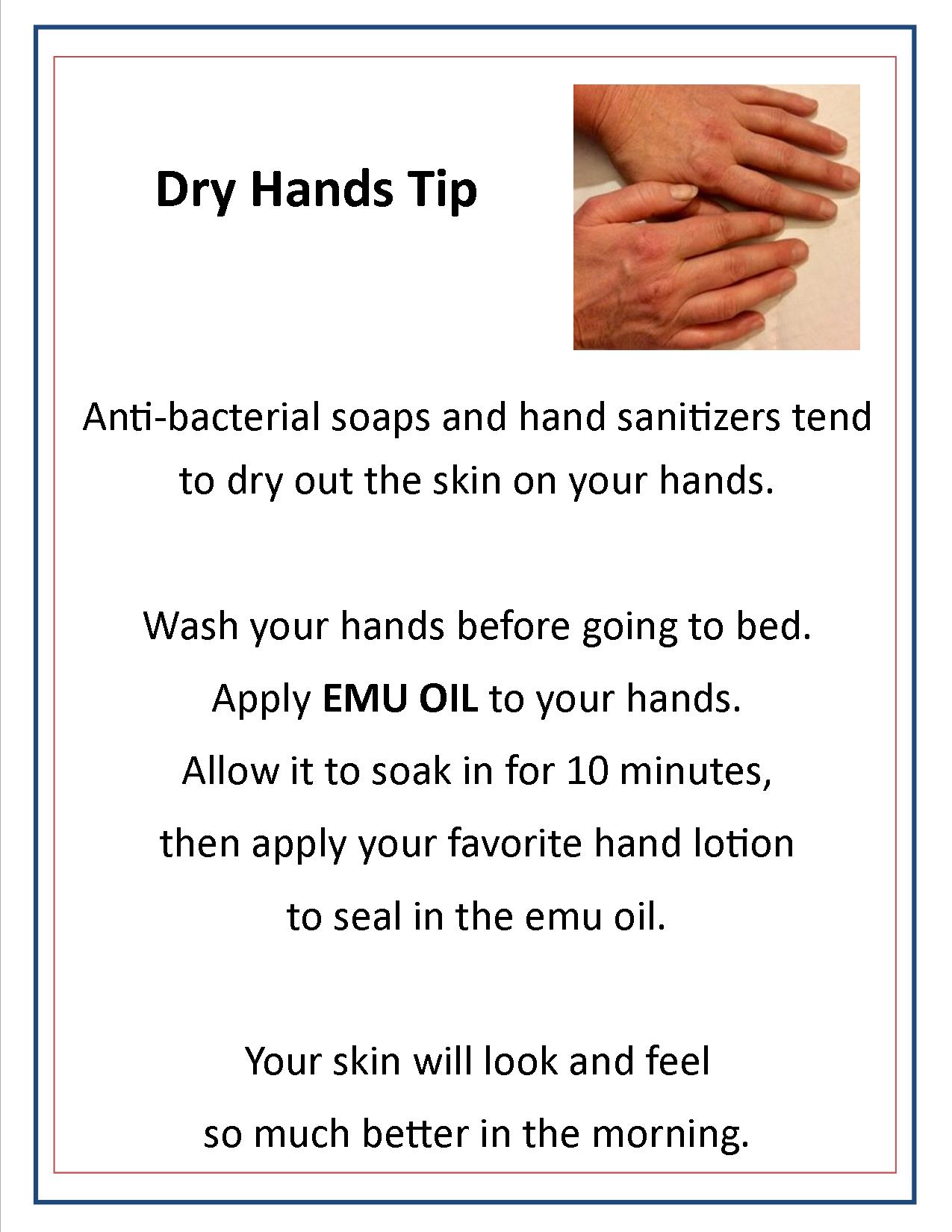

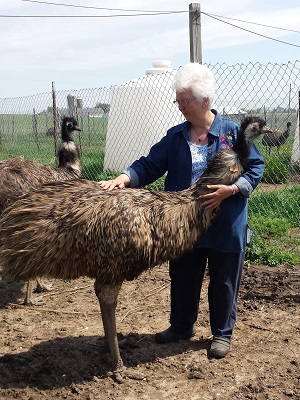
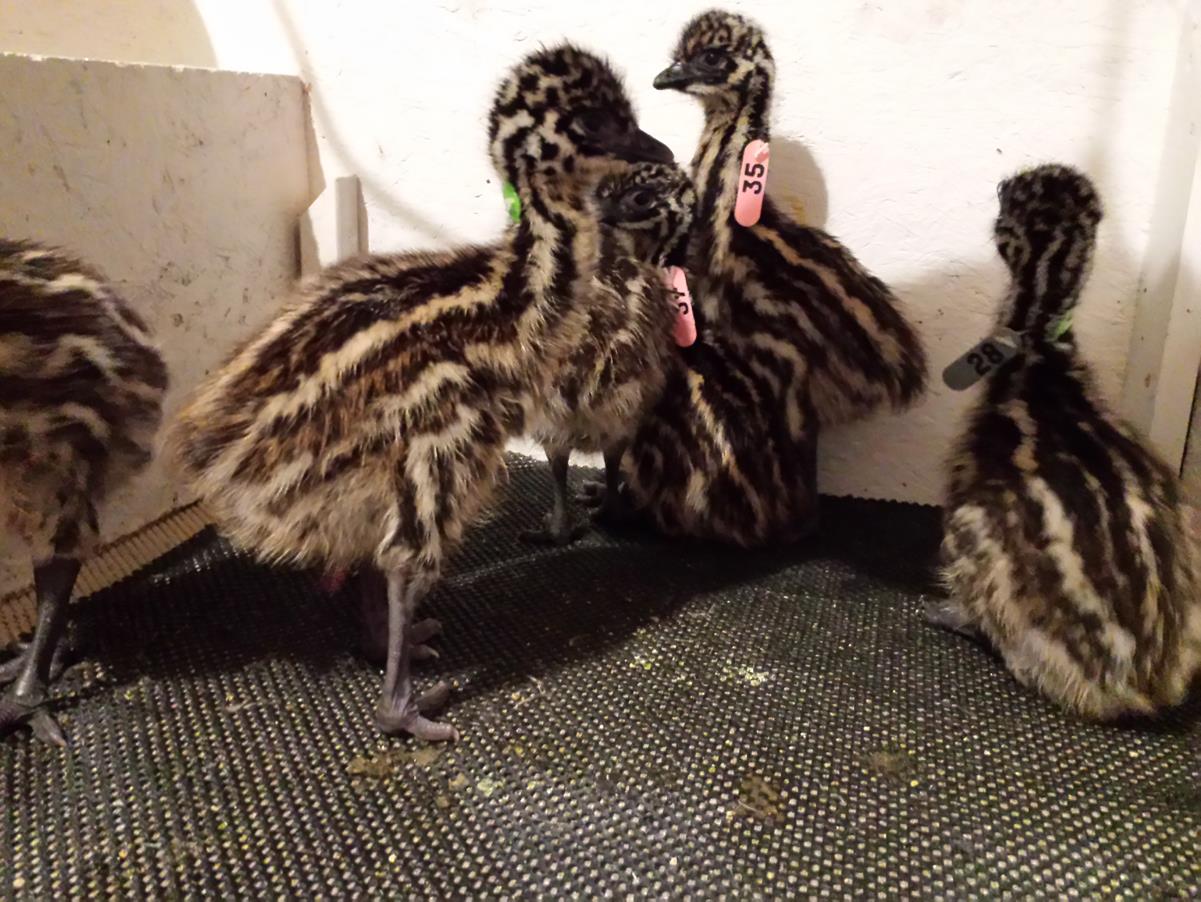
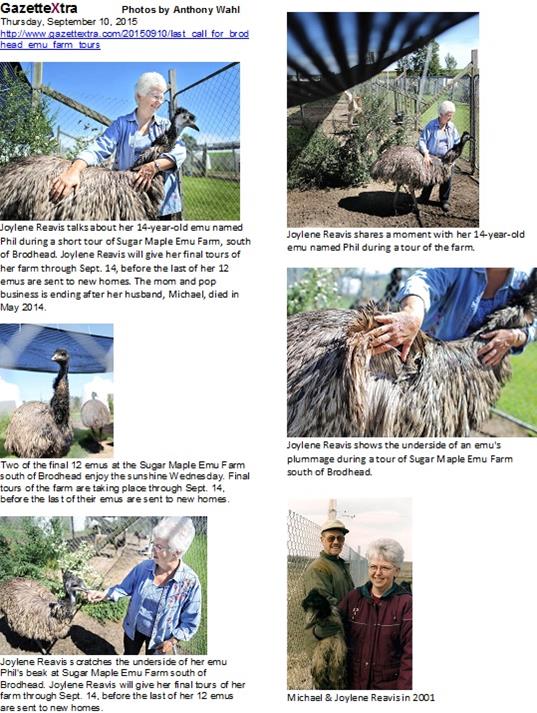
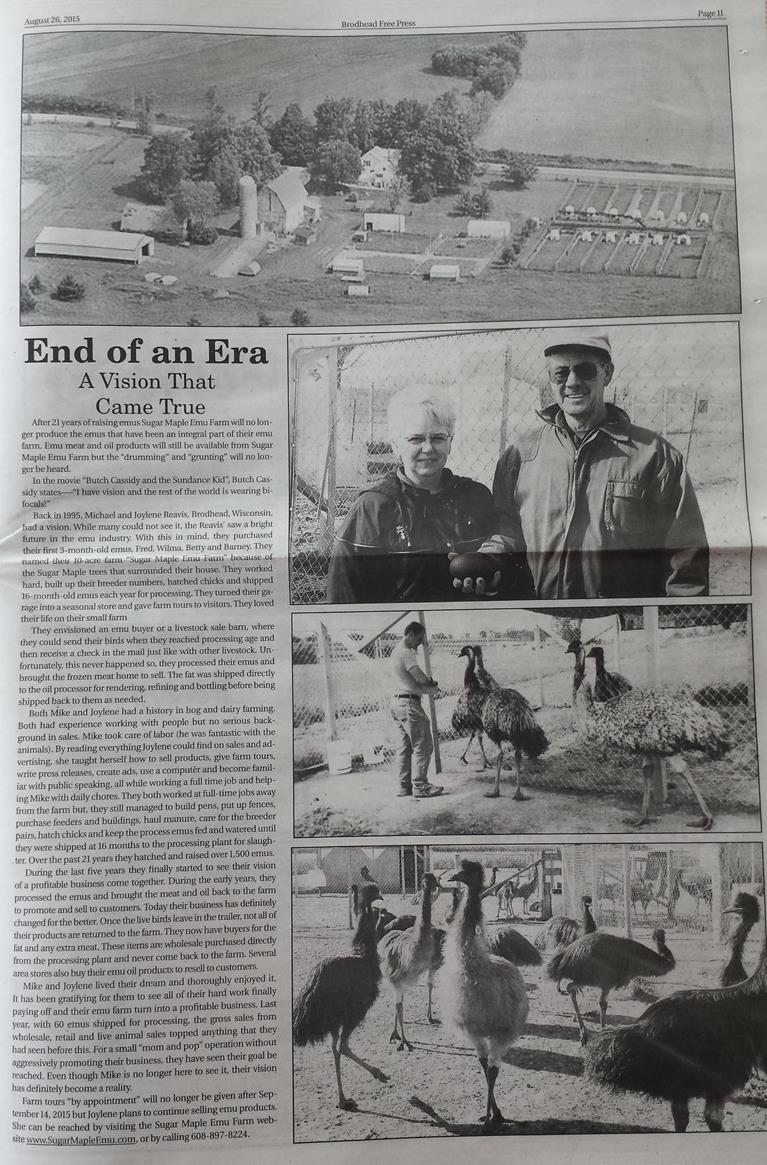
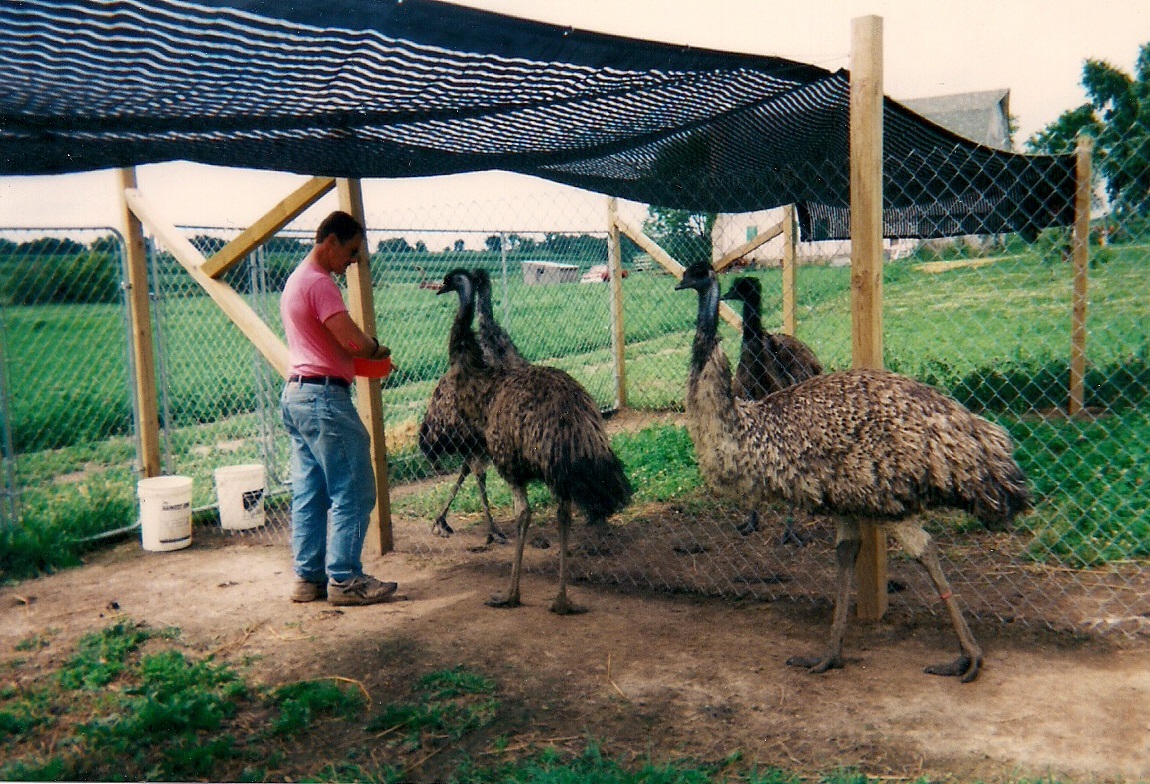
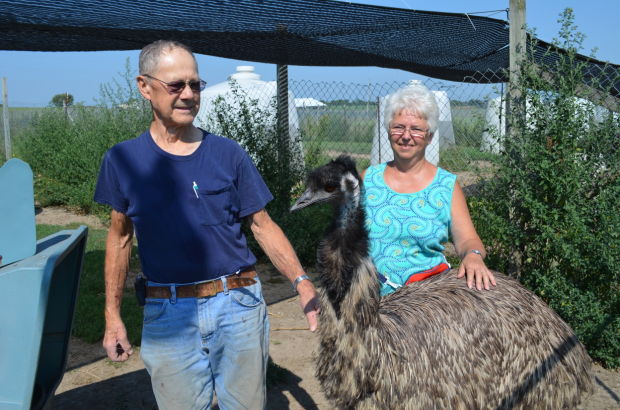
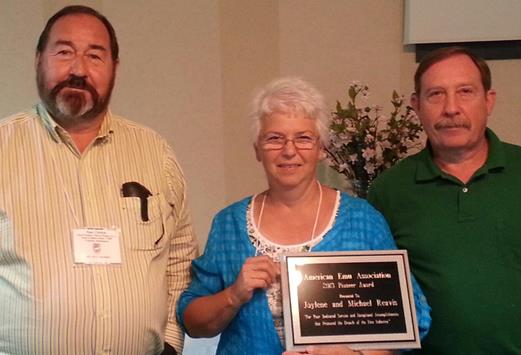
.JPG)
